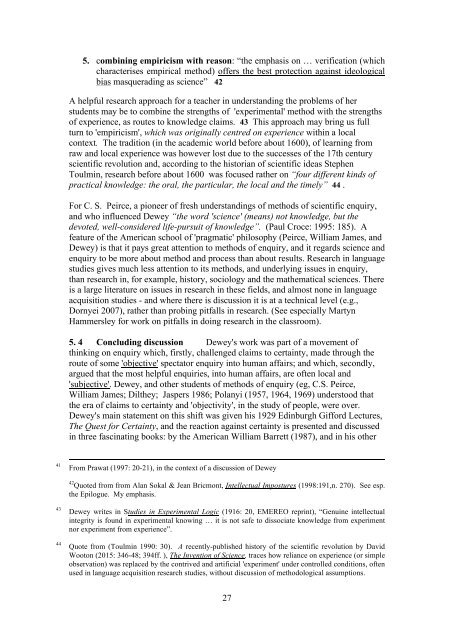RADICAL TEFL
2hqhXJd
2hqhXJd
You also want an ePaper? Increase the reach of your titles
YUMPU automatically turns print PDFs into web optimized ePapers that Google loves.
5. combining empiricism with reason: “the emphasis on … verification (which<br />
characterises empirical method) offers the best protection against ideological<br />
bias masquerading as science” 42<br />
A helpful research approach for a teacher in understanding the problems of her<br />
students may be to combine the strengths of 'experimental' method with the strengths<br />
of experience, as routes to knowledge claims. 43 This approach may bring us full<br />
turn to 'empiricism', which was originally centred on experience within a local<br />
context. The tradition (in the academic world before about 1600), of learning from<br />
raw and local experience was however lost due to the successes of the 17th century<br />
scientific revolution and, according to the historian of scientific ideas Stephen<br />
Toulmin, research before about 1600 was focused rather on “four different kinds of<br />
practical knowledge: the oral, the particular, the local and the timely” 44 .<br />
For C. S. Peirce, a pioneer of fresh understandings of methods of scientific enquiry,<br />
and who influenced Dewey “the word 'science' (means) not knowledge, but the<br />
devoted, well-considered life-pursuit of knowledge”. (Paul Croce: 1995: 185). A<br />
feature of the American school of 'pragmatic' philosophy (Peirce, William James, and<br />
Dewey) is that it pays great attention to methods of enquiry, and it regards science and<br />
enquiry to be more about method and process than about results. Research in language<br />
studies gives much less attention to its methods, and underlying issues in enquiry,<br />
than research in, for example, history, sociology and the mathematical sciences. There<br />
is a large literature on issues in research in these fields, and almost none in language<br />
acquisition studies - and where there is discussion it is at a technical level (e.g.,<br />
Dornyei 2007), rather than probing pitfalls in research. (See especially Martyn<br />
Hammersley for work on pitfalls in doing research in the classroom).<br />
5. 4 Concluding discussion Dewey's work was part of a movement of<br />
thinking on enquiry which, firstly, challenged claims to certainty, made through the<br />
route of some 'objective' spectator enquiry into human affairs; and which, secondly,<br />
argued that the most helpful enquiries, into human affairs, are often local and<br />
'subjective'. Dewey, and other students of methods of enquiry (eg, C.S. Peirce,<br />
William James; Dilthey; Jaspers 1986; Polanyi (1957, 1964, 1969) understood that<br />
the era of claims to certainty and 'objectivity', in the study of people, were over.<br />
Dewey's main statement on this shift was given his 1929 Edinburgh Gifford Lectures,<br />
The Quest for Certainty, and the reaction against certainty is presented and discussed<br />
in three fascinating books: by the American William Barrett (1987), and in his other<br />
41<br />
From Prawat (1997: 20-21), in the context of a discussion of Dewey<br />
42 Quoted from from Alan Sokal & Jean Bricmont, Intellectual Impostures (1998:191,n. 270). See esp.<br />
the Epilogue. My emphasis.<br />
43<br />
44<br />
Dewey writes in Studies in Experimental Logic (1916: 20, EMEREO reprint), “Genuine intellectual<br />
integrity is found in experimental knowing … it is not safe to dissociate knowledge from experiment<br />
nor experiment from experience”.<br />
Quote from (Toulmin 1990: 30). A recently-published history of the scientific revolution by David<br />
Wooton (2015: 346-48; 394ff. ), The Invention of Science, traces how reliance on experience (or simple<br />
observation) was replaced by the contrived and artificial 'experiment' under controlled conditions, often<br />
used in language acquisition research studies, without discussion of methodological assumptions.<br />
27


